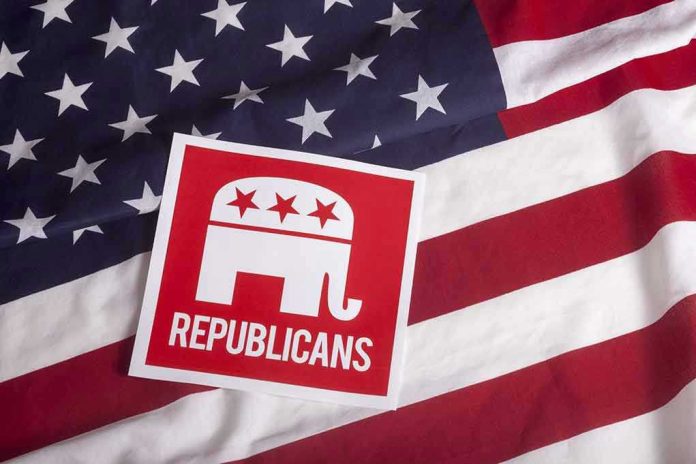
One bill with zero chance of passing just exposed the deepest fault line in the Republican Party—and the city at the center of America’s culture wars may never be the same.
Story Snapshot
- House GOP erupts in open conflict after a bill proposes stripping New York City of federal funds during Zohran Mamdani’s mayoralty.
- The “MAMDANI Act”—named for NYC’s new socialist mayor—has divided Republicans between hardliners and moderates.
- The bill is symbolic, unlikely to become law, but it’s fueling national debates about federalism, urban policy, and the future of both parties.
- Internal backlash reveals how far the GOP is willing to go in punishing progressive cities—and how much risk that strategy carries.
House GOP’s “Ludicrous” Civil War Over NYC Funding
Rep. Buddy Carter (R-GA), eyeing a U.S. Senate seat, didn’t just introduce a bill—he lit a fuse under the Republican caucus. The “MAMDANI Act,” named after Zohran Mamdani, New York City’s new and first openly socialist mayor, would cut off all federal funding for the city as long as Mamdani holds office. Carter’s move was more than another swipe at progressive governance; it was a direct message to both his party and America’s largest city: elect a socialist, and the rest of the country won’t pay your bills. The symbolism was unmistakable, but so was the backlash.
Within days of Mamdani’s stunning victory over Andrew Cuomo and Curtis Sliwa, Carter’s bill had become a rallying cry for the GOP’s most conservative members. “If New Yorkers want communism, we should let them have their wish and not artificially prop them up with our successful capitalist system,” Carter declared, framing the bill as an existential test for the party’s commitment to conservative values. But while some Republicans saw a chance to double down on anti-socialist rhetoric, others recoiled. Moderates and pragmatists called the measure “ludicrous,” warning that punishing millions of Americans for their city’s voting preferences would backfire politically and damage the party’s credibility with urban and suburban voters.
Personalized Politics and the GOP’s Identity Crisis
No recent bill has so powerfully personalized national politics as the MAMDANI Act. By naming the legislation after the mayor himself, Carter ensured maximum media attention and made Mamdani—already a lightning rod for conservative attacks—the face of urban progressivism. For hardliners, the bill was a logical escalation in the culture war, echoing past efforts to withhold funds from “sanctuary cities.” For moderates, it was a bridge too far, setting a dangerous precedent that federal funding could hinge on local election outcomes. The rift exposed a GOP struggling to define itself amid growing polarization between urban and rural America.
House leadership faced a no-win scenario. To block the bill risked angering the party’s base and fueling charges of weakness; to advance it risked alienating swing voters and providing Democrats ammunition for upcoming campaigns. National Democratic operatives, meanwhile, seized the opportunity to portray the GOP as authoritarian and hostile to local democracy, tying Republican candidates to the most extreme rhetoric coming from Carter’s allies.
Symbolic Warfare: Why the MAMDANI Act Still Matters
Despite fiery rhetoric, the MAMDANI Act stands little chance of passage. With Democrats controlling both the Senate and White House, and a significant bloc of GOP moderates refusing to sign on, the bill is widely regarded as political theater. Yet its impact is far from trivial. The episode has intensified scrutiny of Mamdani’s platform, giving Republicans a fresh line of attack and Democrats a rallying point. Political analysts agree: the bill is “purely symbolic,” but it highlights deeper trends—urban progressivism’s rise, rural resentment, and the GOP’s struggle to balance principle with electability.
Within New York City, the threat—however hollow—of losing federal funds has sparked anxiety among residents and city officials. Essential services, from policing to public health, depend on federal dollars. Urban policy experts warn that if such measures ever gained traction, the consequences for millions of Americans would be severe. Yet the greatest impact may be political: the very spectacle of a major party threatening the financial lifeblood of a U.S. city over an election result could reshape how Americans view both parties for years to come.
The Fallout: What Happens When Politics Gets Personal
As the GOP’s internal battle rages, some Republicans see the MAMDANI Act as a necessary warning shot—a way to deter other cities from electing “radicals” and to clarify the party’s values. Others worry the bill will brand the GOP as vindictive and out of touch with the realities of urban America. Democrats, sensing opportunity, are already fundraising off the controversy and using it to energize their base. The national media has seized on the story, amplifying every twist and comment as evidence of a party in turmoil.
The real legacy of the MAMDANI Act may be its role as a cultural litmus test. Will Republicans continue down the path of symbolic warfare, risking alienation from key voting blocs? Or will the party find a way to reconcile its ideological divides before the next election cycle? As the dust settles, one fact is clear: the battle over New York City’s federal funding is about far more than budgets or personalities—it’s a proxy war for the soul of American politics.







